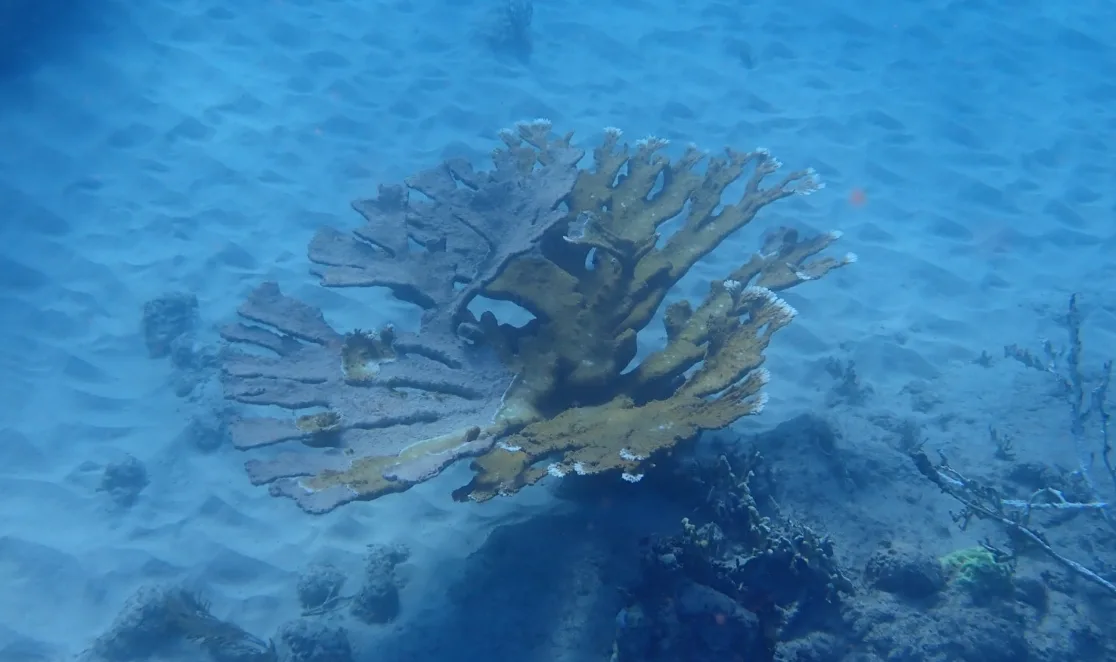Programs Blog
The Crisis of Coral Reef Conservation

October 17, 2024
Location: St. Croix, USVI
Weather: 86˚ F, partly cloudy
Hello again,
My name is Keegan. I am a junior at Syracuse University majoring in Biology with a focus in Environmental Science. I have always been interested in ecological conservation but focusing on coral reefs is not what I previously had in mind. Before this program I knew very little about coral reefs. I knew the basic fun facts that I feel are pretty common such as that reefs support over 25% of all marine species while only occupying around 1% of the ocean floor. I knew that they were important to humans as well, protecting their coastal communities from storms as well as providing a large source of food. I knew the reefs were under a large amount of stress. I did not know, however, how much of this stress was from direct anthropogenic causes (even if we’re not including climate change). Historic mismanagement of fisheries, pollution, destructive fishing practices, and coastal development are all anthropogenic activities that are harming the reefs. Ocean acidification (also anthropogenic) which is the result of increasing CO2 absorption by oceans, slows coral growth as well as causes them to produce weaker structures. These activities in turn with climate change and rising sea temperatures further threaten coral reefs. It promotes the growth of turf algae which often outcompete corals for photosynthetic resources leading to a decrease in coral cover.
Learning this information during our shore component in Woods Hole, before ever seeing a coral firsthand, had me convinced that this research we would be conducting was not only important to coral research but also an extremely worthy cause to be committing a semester to. After seeing these reefs in person and hearing from people who have seen the reefs in better condition made me realize how much we as humans have negatively impacted these reefs. Today we went on a reef recon snorkel to scope out where we wanted to put our transects for tomorrow’s surveys. This particular reef is located within a Marine Protected Area (MPA), which is an area created for conservation of marine ecosystems and resources. The part of the MPA where Isaac Bay (our survey site) is located is a no take zone. This means that no extractive activities are permitted, such as fishing. This location had a higher biodiversity of both fish and coral than where we conducted our last survey, showing that this MPA is doing its job. These areas allow for the reduction of anthropogenic destruction of reefs, giving both coral and fish species a place to grow uninterrupted by human activity.
Ultimately, coral reef conservation requires a major commitment to balancing human activities with the preservation of natural ecosystems. Protecting reefs is not just about saving these beautiful ecosystems, but it is about maintaining the health of the oceans and the well-being of the people who rely on these ecosystems for food and protection from storms. Without urgent action, we risk the extinction of an entire ecosystem for the first time on Earth.
Recent Posts from the Ships
- Ocean Classroom 2024-A collaborative high school program with Proctor Academy
- Collaborations and Long-term Commitments: SEA’s Caribbean Reef Program Sets a Course for Coastal Programs that Compliment Shipboard Experiences.
- Sea Education Association students prepare for life underway using state of the art nautical simulation from Wartsila Corporation.
- SEA Writer 2022, Magazines From the Summer SEA Quest Students
- Technology@SEA: Upgrades Allow Insight into Ocean Depths
Programs
- Gap Year
- Ocean Exploration
- High School
- Science at SEA
- SEA Expedition
- SEAScape
- Pre-College
- Proctor Ocean Classroom
- Protecting the Phoenix Islands
- SPICE
- Stanford@SEA
- Undergraduate
- Climate and Society
- Climate Change and Coastal Resilience
- Coral Reef Conservation
- Marine Biodiversity and Conservation
- MBL
- Ocean Exploration: Plastics
- Ocean Policy: Marine Protected Areas
- Oceans and Climate
- Pacific Reef Expedition
- The Global Ocean: Hawai'i
- The Global Ocean: New Zealand